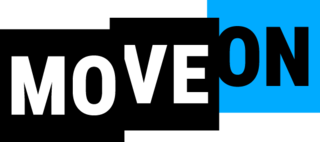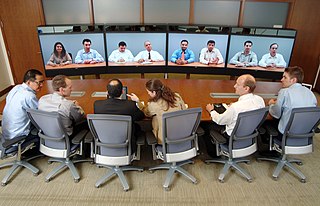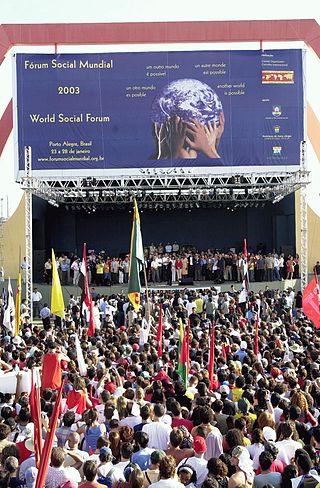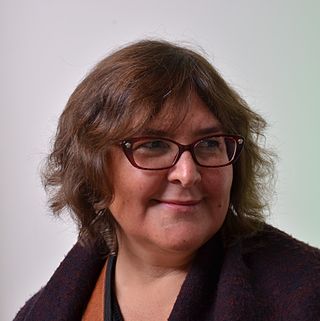
The Internet is the global system of interconnected computer networks that uses the Internet protocol suite (TCP/IP) to communicate between networks and devices. It is a network of networks that consists of private, public, academic, business, and government networks of local to global scope, linked by a broad array of electronic, wireless, and optical networking technologies. The Internet carries a vast range of information resources and services, such as the interlinked hypertext documents and applications of the World Wide Web (WWW), electronic mail, telephony, and file sharing.
Social software, also known as social apps or social platform includes communications and interactive tools that are often based on the Internet. Communication tools typically handle capturing, storing and presenting communication, usually written but increasingly including audio and video as well. Interactive tools handle mediated interactions between a pair or group of users. They focus on establishing and maintaining a connection among users, facilitating the mechanics of conversation and talk. Social software generally refers to software that makes collaborative behaviour, the organisation and moulding of communities, self-expression, social interaction and feedback possible for individuals. Another element of the existing definition of social software is that it allows for the structured mediation of opinion between people, in a centralized or self-regulating manner. The most improved area for social software is that Web 2.0 applications can all promote co-operation between people and the creation of online communities more than ever before. The opportunities offered by social software are instant connections and opportunities to learn.An additional defining feature of social software is that apart from interaction and collaboration, it aggregates the collective behaviour of its users, allowing not only crowds to learn from an individual but individuals to learn from the crowds as well. Hence, the interactions enabled by social software can be one-to-one, one-to-many, or many-to-many.

MoveOn is a progressive public policy advocacy group and political action committee. Formed in 1998 around one of the first massively viral email petitions, MoveOn has since grown into one of the largest and most impactful grassroots progressive campaigning communities in the United States, with a membership of millions. MoveOn did not endorse a candidate during the 2020 presidential primary campaign; it then endorsed and actively supported Joe Biden in the general election. Rahna Epting has been Executive Director of MoveOn Civic Action and MoveOn Political Action since 2019.
The Association for Progressive Communications (APC) is an international network of organizations that was founded in 1990 to provide communication infrastructure, including Internet-based applications, to groups and individuals who work for peace, human rights, protection of the environment, and sustainability. Pioneering the use of ICTs for civil society, especially in developing countries, APC were often the first providers of Internet in their member countries.

E-democracy, also known as digital democracy or Internet democracy, uses information and communication technology (ICT) in political and governance processes. The term is credited to digital activist Steven Clift. By using 21st-century ICT, e-democracy seeks to enhance democracy, including aspects like civic technology and E-government. Proponents argue that by promoting transparency in decision-making processes, e-democracy can empower all citizens to observe and understand the proceedings. Also, if they possess overlooked data, perspectives, or opinions, they can contribute meaningfully. This contribution extends beyond mere informal disconnected debate; it facilitates citizen engagement in the proposal, development, and actual creation of a country's laws. In this way, e-democracy has the potential to incorporate crowdsourced analysis more directly into the policy-making process.

A collaboration tool helps people to collaborate. The purpose of a collaboration tool is to support a group of two or more individuals to accomplish a common goal or objective. Collaboration tools can be either of a non-technological nature such as paper, flipcharts, post-it notes or whiteboards. They can also include software tools and applications such as collaborative software.
Internet activism involves the use of electronic-communication technologies such as social media, e-mail, and podcasts for various forms of activism to enable faster and more effective communication by citizen movements, the delivery of particular information to large and specific audiences, as well as coordination. Internet technologies are used by activists for cause-related fundraising, community building, lobbying, and organizing. A digital-activism campaign is "an organized public effort, making collective claims on a target authority, in which civic initiators or supporters use digital media." Research has started to address specifically how activist/advocacy groups in the U.S. and in Canada use social media to achieve digital-activism objectives.
Electronic participation (e-participation) refers to the use of ICT in facilitating citizen participation in government-related processes, encompassing areas such as administration, service delivery, decision-making, and policy-making. As such, e-participation shares close ties with e-government and e-governance participation. The term's emergence aligns with the digitization of citizen interests and interactions with political service providers, primarily due to the proliferation of e-government.
The United States Social Forum is an ongoing series of gatherings of social justice activists in the United States which grew out of the World Social Forum process, bringing together activists, organizers, people of color, working people, poor people, and indigenous people from across the United States. Its purpose is to build unity around common goals of social justice, build ties between organizations at the event, and help build a broader social justice movement. Planning for the first event was spearheaded by the organization Project South: Institute for the Elimination of Poverty and Genocide, and involved dozens of other organizations around the United States. The Forum defines itself as "a movement-building process. It is not a conference but it is a space to come up with the peoples’ solutions to the economic and ecological crisis. The USSF is the next most important step in our struggle to build a powerful multi-racial, multi-sectoral, inter-generational, diverse, inclusive, internationalist movement that transforms this country and changes history."
Alfredo Jose Miguel Lopez is an activist, writer, media producer, teacher and organizer in Brooklyn, New York. He is currently a well-known Internet activist and the Co-Director of May First/People Link, a progressive Internet users' organization and the Internet's oldest progressive provider.
The Electronic Frontier Foundation (EFF) is an international non-profit digital rights group based in San Francisco, California. The foundation was formed on 10 July 1990 by John Gilmore, John Perry Barlow and Mitch Kapor to promote Internet civil liberties.
NGP VAN, Inc. is an American privately owned voter database and web hosting service provider used by the Democratic Party, Democratic campaigns, and other non-profit organizations authorized by the Democratic Party. The platform or service is used by political and social campaigns for fundraising, campaign finance compliance, field organizing, and digital organizing. NGP VAN, Inc. was formerly known as Voter Activation Network, Inc. and changed its name to NGP VAN, Inc. in January 2011. The company was founded in 2001 and is based in Washington, D.C., with an additional location in Somerville, Massachusetts.

Satish Babu is a Free Software activist, early Internet advocate, and development professional based out of Kerala, India. He is the founding Director of the International Centre for Free and Open Source Software (ICFOSS), an autonomous academic/research institution of the Government of Kerala, India, where he worked from March 2011 to September 2015. He was earlier the CEO of SIFFS, an NGO of small-scale artisanal fishers of south India; a co-founder and President of InApp Information Technologies; and is associated with international and national professional societies such as IEEE, Internet Society (ISOC), ICANN, and the Computer Society of India (CSI).

The World Social Forum is an annual meeting of civil society organizations, first held in Brazil, which offers a self-conscious effort to develop an alternative future through the championing of counter-hegemonic globalization.

Loomio is decision-making software and web service designed to assist groups with collaborative, consensus-focused decision-making processes. It is a free software web application, where users can initiate discussions and put up proposals. As the discussions progress to initiating a proposal, the group receives feedback through an updatable pie chart or other data visualizations. Loomio is basically a web based forum with tools to facilitate conversations and decision making processes from starting and holding conversations to reaching outcome.
Civic technology, or civic tech, enhances the relationship between the people and government with software for communications, decision-making, service delivery, and political process. It includes information and communications technology supporting government with software built by community-led teams of volunteers, nonprofits, consultants, and private companies as well as embedded tech teams working within government.

Swecha is a non-profit organization formerly called as Free Software Foundation Andhra Pradesh (FSF-AP) later changed its name to Swecha. It is a Telugu Operating System released in the year 2005, and is a part of Free Software Movement of India (FSMI). The organization is a social movement working towards educating the masses with the essence of Free Software and to provide knowledge to the commoners.
A platform cooperative, or platform co-op, is a cooperatively owned, democratically governed business that establishes a computing platform, and uses a website, mobile app or a protocol to facilitate the sale of goods and services. Platform cooperatives are an alternative to venture capital-funded platforms insofar as they are owned and governed by those who depend on them most—workers, users, and other relevant stakeholders.

Anriette Esterhuysen is a human rights defender and computer networking pioneer from South Africa. She has pioneered the use of Internet and Communications Technologies (ICTs) to promote social justice in South Africa and throughout the world, focusing on affordable Internet access. She was the executive director of the Association for Progressive Communications from 2000 until April 2017, when she became APC's Director of Policy and Strategy. In November 2019 United Nations Secretary-General António Guterres appointed Esterhuysen to chair the Internet Governance Forum’s Multistakeholder Advisory Group.

The Chamber of Progress is an American trade group that represents technology companies on issues such as antitrust law, content moderation, and self-driving cars. The group describes itself as a progressive advocacy organization, while some have characterized it as an astroturfing corporate front group opposing government regulation and unionization. It was established in 2020 by Adam Kovacevich and is funded by Amazon, Uber, Meta, Google, Apple, Twitter, and other technology companies.









